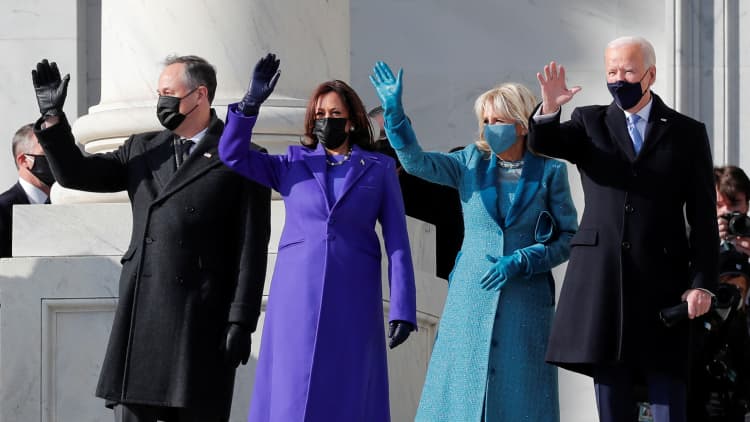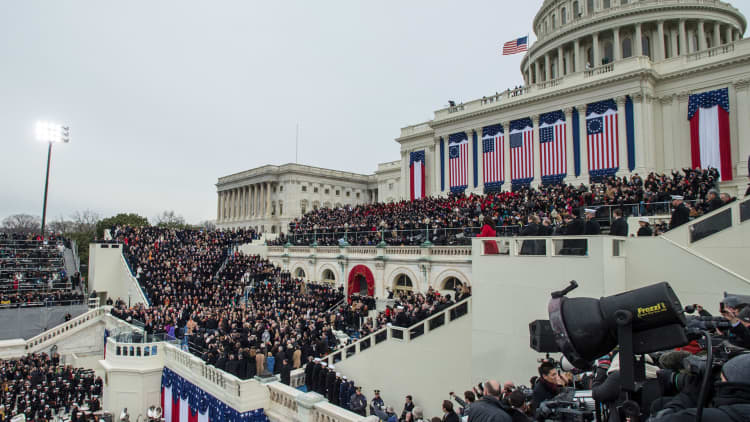
Joseph Robinette Biden Jr. became the 46th U.S. president on Wednesday, completing the most daunting power transfer in recent American history.
Inaugurated in a fortified Washington under the shadow of the coronavirus pandemic, the 78-year-old Democrat took the oath of office at the U.S. Capitol in front of a sparse bipartisan crowd.
He enters the White House exactly two weeks after a mob inflamed by his predecessor, Donald Trump, stormed the Capitol, disrupting the transition to Biden's administration and leaving five people dead.
Biden took the oath of office from Supreme Court Chief Justice John Roberts, with his left hand on a family Bible. During an inaugural address in which he called on Americans to reject efforts to sow division and pledged to work for the voters who did not support him, Biden declared, "Democracy has prevailed."
"On this hallowed ground where, just a few days ago, violence sought to shake the Capitol's very foundation, we come together as one nation, under God, indivisible, to carry out the peaceful transfer of power as we have for more than two centuries," Biden said.

Biden, the oldest American president, faces swirling crises as he and Vice President Kamala Harris take power. At 56, she became the first woman, first Black American and first South Asian American to become vice president.
Biden will try to streamline the biggest vaccination effort in U.S. history to contain a virus that has claimed more than 400,000 lives nationwide. He will aim to boost an economy in which about 18 million people are receiving unemployment benefits and food banks experience demand unseen in decades.
"In the work ahead of us, we're going to need each other. We need all of our strength to persevere through this dark winter," the president said.
Biden will try to implement a broad agenda while navigating a country where millions of people, including members of Congress, fed disinformation by Trump question the legitimacy of his victory in the November election. In his remarks, the president said the country must "reject the culture where facts themselves are manipulated and even manufactured." Biden called on Americans to "defend the truth and defeat the lies."
Biden, a Democrat, won the presidency in November in his third try. His first attempt came during the 1988 presidential cycle, followed by a 2008 primary loss to his future boss Barack Obama.
Biden served two terms as Obama's vice president from 2009 to 2017. He took the job after 36 years in the Senate representing Delaware, a state Biden has said "will be written on my heart." Biden joined the Senate when he was 30.
This time, Biden ran as the person best equipped to defeat Trump. Concerns bubbled within his party that his record on racial justice and the social safety net left him unprepared to confront the country's challenges. Biden pledged to "restore the soul of America," and clinched his party's presidential nomination after early stumbles.
Tragedy and compassion
Campaigning during the pandemic, Biden aimed to show a compassion built through tragedy. He often opened up about the deaths of his first wife, Neilia, and young daughter, Naomi, in a 1972 car crash, and his adult son Beau's passing from brain cancer in 2015.
Biden enters office trying to curb the pain wrought by the pandemic. He paused during his remarks for a moment of silence to recognize the Americans who died from the virus, asking the country to "honor them by becoming a people and a nation we know we can and should be."
Working with narrow majorities in the House and Senate, Biden will first try to pass a $1.9 trillion coronavirus relief package. Other priorities include health care, immigration and climate change. He will start to address some of those issues with executive orders on his first day in office.
Biden said the country "will be judged by how we resolve these cascading crises of our era" — the pandemic, threats to democracy, systemic racism, economic inequity and climate change.
Throughout his campaign, Biden contended he could win Republicans to his cause, especially because of his relationships in the Senate. The next two years will test his sway in a Trump-centric GOP. Democrats will need 10 Republican votes to pass most legislation in the chamber.
The shadow of Trump
Trump's presence loomed over the day's ceremonies. He became the first president since Andrew Johnson in 1869 not to attend his successor's inauguration.
He left the White House for Florida on Thursday morning, hours before Biden took his oath of office. After he gave brief remarks to supporters, Trump lifted off in Air Force One while Biden attended a Catholic mass with masked Democratic and Republican congressional leaders.
Biden on Wednesday tried to create a contrast from his predecessor, who will face his second impeachment trial in the coming weeks after the House charged him with inciting an insurrection at the Capitol.
"Before God and all of you, I give you my word. I will always level with you," he said. "I'll defend the Constitution. I'll defend our democracy. I'll defend America."
Trump's second-in-command, Mike Pence, Senate Majority Leader Mitch McConnell, R-Ky., and House Minority Leader Kevin McCarthy, R-Calif., attended the inauguration. So did former Presidents Obama, George W. Bush and Bill Clinton.
McCarthy, House Minority Whip Steve Scalise, R-La., and Sen. Ted Cruz, R-Texas, were among the lawmakers who voted against counting Biden's win in Congress hours after the Capitol attack and then attended his inauguration.
The inauguration took place with a smaller crowd, faces covered to slow the spread of the virus. The Jan. 6 insurrection, during which some rioters smashed their way into the Capitol and called to "Hang Mike Pence," led to tightened security.
Streets around the Capitol were closed Wednesday. More than 25,000 National Guard members patrolled Washington in a show of force.
The National Guard vetted forces amid concerns about insider threats, removing two people for "inappropriate" comments and 10 more for other reasons.
While the day looked different from any inauguration in recent memory, Biden cast it as a triumph for the transfer of power in the U.S. He noted that he stood in a spot where two weeks ago, a "riotous mob thought they could use violence to silence the will of the people, to stop the work of our democracy, to drive us from this sacred ground."
"It did not happen. It will never happen. Not today, not tomorrow, not ever. Not ever."



